#salesforce database administrator
Explore tagged Tumblr posts
Text
Professional Salesforce Remote Admin Services
Discover the expertise of our skilled team of Salesforce Admin Services professionals dedicated to optimizing your CRM. We provide tailored solutions to drive business success. Uncover the potential of Salesforce with insights from experienced remote administrators. Explore our Salesforce Admin Services to know more.
#Salesforce Admin Services#salesforce administration services#salesforce database administrator#hire a salesforce administrator#remote salesforce administrator#salesforce delegated administration#salesforce system administrator#what is a salesforce administrator#salesforce.com certified administrator#salesforce administrator#part time remote salesforce administrator#salesforce advanced administrator#salesforce administrator roles and responsibilities#salesforce admin services#salesforce administration#salesforce admin consultant#hire on demand salesforce admin#on demand salesforce admin#on demand salesforce consultant#remote salesforce consulting
0 notes
Text
Can a Manual Tester Become a Salesforce Developer? Absolutely. Here's How.
Ever found yourself knee-deep in manual testing and wondering, "What if I could build the stuff I'm testing?" Well, good news: you totally can. Transitioning from manual testing to becoming a Salesforce Developer is not just possible—it might be one of the smartest career moves you can make. Especially if you're already exploring tools like Provar, a Salesforce automation tool that bridges the gap between testers and developers.
In this post, we’ll break down how you can shift gears from manual testing to Salesforce development, the skills you'll need, and how tools like Provar can help along the way.
Why Consider the Switch?
Manual testing is a great entry point into the tech world. You've got the analytical mindset, the attention to detail, and the experience working with systems. But let’s be real: it can feel repetitive, and there's often a ceiling in terms of growth.
Salesforce Development, on the other hand, opens the door to:
Higher salaries and better job stability
Creative problem-solving using Apex (Salesforce's programming language)
More influence in the SDLC (Software Development Life Cycle)
Remote-friendly work opportunities
So if you’re already familiar with how Salesforce apps should behave, you're halfway there.
What Do Salesforce Developers Actually Do?
Salesforce Developers create custom functionality on the Salesforce platform using tools like Apex (similar to Java), Visualforce (for UI), and Lightning Components (modern UI framework). They build things like:
Custom apps and workflows
Automated business processes
Integrations with other systems (like Slack, Gmail, etc.)
This means turning business needs into working features—something manual testers are already good at analyzing.
Skills You Already Have (and How They Translate)
If you’re coming from a manual testing background, you already have some golden skills that will make your move into Salesforce development a whole lot easier.
Understanding of Test Cases: You know how to think through different scenarios and outcomes. This will help you write smarter, more accurate logic and validations when you start coding.
System Thinking: As a tester, you’re already used to seeing the bigger picture and how parts of a system interact. This skill is crucial for designing scalable, efficient solutions as a developer.
Bug Reporting: You’ve spent a lot of time identifying and documenting bugs. That attention to detail translates directly into writing cleaner, error-free code.
Familiarity with Salesforce UI: If you've tested Salesforce apps before, you already have a head start! Knowing your way around the Salesforce interface gives you a solid foundation for building apps, especially when working with Lightning components.
Skills You Need to Pick Up
Don’t worry—you don’t need a Computer Science degree to become a Salesforce Developer. Here's what you'll want to learn:
Apex: Salesforce's proprietary Java-like language
SOQL: Salesforce Object Query Language for database operations
Lightning Web Components: For building responsive UIs
Salesforce Admin Skills: Understand objects, fields, workflows, etc.
Pro tip: Use Provar to bridge the knowledge gap. Since Provar automates testing within Salesforce, it helps manual testers learn about object relationships, workflows, and backend logic organically. It’s like learning to swim while already floating.
Suggested Learning Path
Let’s break it down step-by-step:
Get Certified as a Salesforce Administrator
Understand the basics: objects, fields, workflows, validation rules
Tools: Trailhead (Salesforce’s free learning hub)
Start Learning Apex and SOQL
Use Trailhead modules or YouTube tutorials
Play around in a free Salesforce Developer Org
Build Mini Projects
Try creating a custom app or automating a simple process
Document what you build—this is gold for your portfolio
Work with Provar or Similar Tools
Provar helps you understand how automation integrates with development
Try writing tests while experimenting with backend configurations
Contribute to Open Source or Freelance
Try doing small gigs or helping nonprofits
These experiences build confidence fast
Real Talk: Common Roadblocks (and How to Overcome Them)
"I don’t have a coding background."
That’s okay! Apex is beginner-friendly and well-documented. Start slow and build consistently.
"I’m afraid of making the leap."
Think of this as a skill expansion, not a total restart. You can even start by becoming a Salesforce Test Automation Engineer using Provar, and grow from there.
"Will employers take me seriously?"
Absolutely, especially if you have a strong testing background. Add some Trailhead badges and a few project demos, and you're in the game.
Why Provar Can Be Your Secret Weapon?
Provar is not just for testers. It’s also a great way to:
Understand how test automation works under the hood
Get exposure to Salesforce objects, workflows, and APIs
Bridge the tester-to-developer knowledge gap
As someone already familiar with Salesforce Testing, you can use Provar to:
Write functional test scripts and see how they map to backend logic
Experiment with edge cases and error handling (just like developers do)
Collaborate more effectively with dev teams
So yeah, Provar isn’t just a tool—it’s your training ground.
Career Growth Opportunities
Once you transition to Salesforce Development, you can branch out into:
Salesforce Architect
Technical Consultant
Product Manager (with technical chops!)
Lead Developer or Team Lead
And since Salesforce is huge across industries, you'll find opportunities in finance, healthcare, education, and tech.
Final Thoughts: Start Where You Are
Switching from manual testing to Salesforce Development isn’t just a dream—it’s a plan. With the right mindset, consistent learning, and the help of tools like Provar, you're already on your way. Don’t wait to be "ready." Start exploring, tinkering, and learning today.
Remember, your background in Salesforce Testing already gives you a leg up. All that’s left is to write some code, build something cool, and show the world what you can do.
Thinking about where to begin? Fire up Trailhead, launch a dev org, and automate your first test in Provar. You're not just testing anymore—you're building the future of Salesforce.
Ready to make the jump? We at Provar are cheering you on.
#can a manual tester become salesforce developer#salesforce developer#salesforce testing#provar#salesforce blog
0 notes
Text
Why Every Business Needs a Salesforce Developer: The Growing Demand for CRM Experts

Customer relationship management (CRM) is the backbone of modern business, and Salesforce is the most widely used CRM platform worldwide. As businesses rely more on Salesforce to streamline operations, the demand for Salesforce developers is skyrocketing. Companies across industries are actively searching for skilled professionals, creating a surge in career opportunities for those with Salesforce expertise.
With the tech talent gap growing, businesses are turning to technology solutions and USA recruitment agencies to find certified Salesforce professionals. But what makes this role essential, and why should IT professionals consider a career in Salesforce development?
The Rising Demand for Salesforce Developers
Salesforce is no longer just a sales tool—it’s an end-to-end business solution that integrates marketing, analytics, automation, and customer service. The need for skilled developers has surged due to:
Business Growth & Digital Transformation – Companies invest heavily in CRM to improve customer experience.
Customization Needs – Businesses require developers to tailor Salesforce features to their unique workflows.
Integration with Other Systems – Salesforce must connect seamlessly with third-party apps and databases.
Data Security & Compliance – Organizations need experts to configure secure and compliant CRM environments.
Because of these factors, technical recruiters in the US are constantly searching for Salesforce-certified professionals.
Career Opportunities in Salesforce Development
For job seekers looking to enter a high-demand field, Salesforce development offers:
Lucrative Salaries – Salesforce developers earn competitive salaries with opportunities for rapid career growth.
Global Demand – Skills in Salesforce are sought in the US job market and worldwide.
Diverse Career Paths – Professionals can specialize in roles like Salesforce Developer, Administrator, or Architect.
Remote & Flexible Work – Many businesses offer remote opportunities, making this a flexible career choice.
By leveraging IT recruitment services, professionals can connect with top employers looking for Salesforce expertise.
How Businesses Can Find the Right Salesforce Talent
With the increasing demand for CRM specialists, companies face challenges in hiring the right talent. That’s where USA job placement services come in, helping businesses find skilled Salesforce developers quickly. Companies can benefit from:
Access to Pre-Vetted Candidates – Saving time on recruitment.
Specialized Technical Hiring – Ensuring candidates have the proper certifications and experience.
Flexible Hiring Models – Contract, full-time, and remote staffing options.
Final Thoughts
As businesses continue to prioritize customer experience, the role of Salesforce developers will only grow. Whether you’re an IT professional looking for career growth or a company searching for top talent, technology staffing solutions and USA recruitment agencies can bridge the gap.
With Salesforce becoming a business necessity, hiring the right developers isn’t just an option—it’s a competitive advantage.
#employeeengagement#workplaceculture#hr consultancy#workforce#talent acquisition#employeeretention#workforcesolutions#data science
0 notes
Text
IT campus guru- 100% placement Guaranteed, Best IT training institute in Nagpur
"IT Campus Guru provides a wide group of opportunities for freshers and Experienced candidate who can develop their skills and build their career opportunities across multiple Companies, even if you have average English communication skills and non IT background you can create a bright IT career with IT Campus Guru. We offer courses like Full Stack Java, Python, DoNet, Software Testing, Data Science, Power BI, Salesforce training, Oracle Database development, UI UX Web designing & development, Devops, MERN Stack, MEAN Stack training program also No Coding curriculum like Windows Administrator, CCNA, LINUX, cloud Architect and mobile IOS & Android Developer training program, and more. With faith in your abilities, we ensure 100% job Guarantee"
#it course in nagpur#it training institute in nagpur#best it training institute in nagpur#nagpur it training institute#it training in nagpur#It courses in nagpur#Best it training in nagpur#java course in nagpur#java classes in nagpur#python classes in nagpur#python course in nagpur#software courses in nagpur#data science course in nagpur#data science classes in nagpur#coding classes in nagpur#web development classes in nagpur#training and placement in nagpur#it courses in nagpur with placement#100 job guarantee course in nagpur#pay after placement courses in nagpur
0 notes
Text
Informatica Training in Chennai | Informatica Cloud IDMC
The Role of the Secure Agent in Informatica Cloud
Introduction
Informatica Cloud is a powerful data integration platform that enables businesses to connect, transform, and manage data across cloud and on-premises environments. One of its core components is the Secure Agent, which plays a crucial role in facilitating secure communication between Informatica Cloud and an organization's local network. This article explores the role, functionality, and benefits of the Secure Agent in Informatica Cloud.

What is the Secure Agent?
The Secure Agent is a lightweight, self-upgrading runtime engine installed on a customer’s local network or cloud infrastructure. It acts as a bridge between on-premises applications, databases, and Informatica Intelligent Cloud Services (IICS). By using the Secure Agent, businesses can process, integrate, and synchronize data between cloud and on-premises sources securely. Informatica Cloud IDMC Training
Key Roles and Responsibilities of the Secure Agent
1. Secure Data Movement
The Secure Agent ensures safe and encrypted data transmission between on-premises systems and Informatica Cloud. It eliminates the need to expose sensitive business data directly to the internet by handling all connections securely behind a company’s firewall.
2. Data Integration and Processing
A primary function of the Secure Agent is executing ETL (Extract, Transform, Load) and ELT (Extract, Load, Transform) processes. It extracts data from source systems, applies necessary transformations, and loads it into the target system. By running these processes locally, organizations can optimize performance while maintaining data security.
3. Job Execution and Management
The Secure Agent is responsible for executing data integration tasks, mapping configurations, and workflow automation. It supports various Informatica Cloud services, including: Informatica IICS Training
Data Integration
Application Integration
API Management
Data Quality
Master Data Management (MDM)
It efficiently manages job execution, ensuring data pipelines operate smoothly.
4. Connectivity with On-Premises and Cloud Sources
Organizations often have hybrid environments where some data resides in on-premises databases while others exist in cloud platforms. The Secure Agent enables seamless connectivity to databases like Oracle, SQL Server, MySQL, and applications such as SAP, Salesforce, Workday, and more.
5. Security and Compliance
Security is a major concern for enterprises handling sensitive data. The Secure Agent ensures that data remains within the organization’s control by encrypting data at rest and in transit. It complies with industry standards like GDPR, HIPAA, and SOC 2 to maintain robust data security.
Benefits of Using the Secure Agent: Informatica IDMC Training
1. Enhanced Security
Prevents data exposure to the internet
Uses encryption and secure authentication mechanisms
Runs behind the firewall, ensuring compliance with security policies
2. Performance Optimization
Enables on-premises data processing, reducing latency
Supports parallel execution of tasks for better efficiency
Handles large volumes of data with optimized performance
3. Scalability and Reliability
Auto-upgrades to the latest versions without manual intervention
Distributes workloads efficiently, ensuring high availability
Handles failures through automatic retries and error logging
4. Simplified Management
Intuitive UI for monitoring and managing tasks
Seamless integration with Informatica Cloud for centralized administration
No need for complex firewall configurations or VPN setups
How to Install and Configure the Secure Agent
Setting up the Secure Agent is straightforward: Informatica Cloud Training
Download the Secure Agent from the Informatica Cloud UI.
Install the agent on a local server or cloud instance.
Authenticate the agent using the provided credentials.
Configure connectivity to required on-premises or cloud applications.
Verify the installation and start running data integration tasks.
Conclusion
The Secure Agent in Informatica Cloud is a crucial component for organizations looking to integrate and process data securely across hybrid environments. It ensures seamless connectivity, secure data movement, optimized performance, and compliance with industry standards. By leveraging the Secure Agent, businesses can achieve robust data integration without compromising security or performance, making it an essential tool in the modern data landscape.
For More Information about Informatica Cloud Online Training
Contact Call/WhatsApp: +91 7032290546
Visit: https://www.visualpath.in/informatica-cloud-training-in-hyderabad.html
#Informatica Training in Hyderabad#IICS Training in Hyderabad#IICS Online Training#Informatica Cloud Training#Informatica Cloud Online Training#Informatica IICS Training#Informatica IDMC Training#Informatica Training in Ameerpet#Informatica Online Training in Hyderabad#Informatica Training in Bangalore#Informatica Training in Chennai#Informatica Training in India#Informatica Cloud IDMC Training
0 notes
Text
Leveraging Technology for Commercial Loan Brokering Success!
Introduction:
In today’s digital age, technology plays a crucial role in streamlining processes, enhancing efficiency, and driving success in commercial loan brokering. From client management to deal structuring and market analysis, there are numerous technology tools and software solutions available to help commercial loan brokers succeed. This article explores some of the best technology tools and software for commercial loan brokers and how they can be leveraged to improve productivity, client service, and overall business performance. 1. Client Relationship Management (CRM) Systems:
CRM systems are essential for managing client interactions, tracking leads, and organizing communication. These platforms allow brokers to maintain a centralized database of client information, streamline communication, and track the progress of deals.
Examples: Salesforce, HubSpot, Zoho CRM.
Benefits: Improved client engagement, efficient lead management, automated follow-ups. 2. Loan Origination Software:
Loan origination software streamlines the loan application process, from initial application submission to underwriting and approval. These platforms often include features such as document management, automated workflows, and compliance tracking.
Examples: Encompass, Calyx Point, LendingPad.
Benefits: Faster loan processing, reduced paperwork, enhanced compliance. 3. Financial Analysis Tools:
Financial analysis tools help brokers evaluate the financial health of potential borrowers and assess the viability of loan proposals. These tools typically include features for financial statement analysis, ratio calculation, and risk assessment.
Examples: Riskalyze, Sageworks, Finsight.
Benefits: Accurate risk assessment, informed decision-making, enhanced due diligence. 4. Market Research Platforms:
Market research platforms provide access to data and insights on commercial real estate markets, property trends, and industry news. Brokers can use these platforms to stay informed about market conditions, identify investment opportunities, and advise clients accordingly.
Examples: CoStar, Reonomy, Real Capital Analytics.
Benefits: Comprehensive market analysis, property valuations, investment insights. 5. Document Management Systems:
Document management systems help brokers organize, store, and share documents securely. These platforms streamline document workflows, ensure compliance with regulations, and facilitate collaboration with clients and partners.
Examples: DocuSign, Dropbox Business, SharePoint.
Benefits: Secure document storage, streamlined workflows, improved collaboration. 6. Communication and Collaboration Tools:
Communication and collaboration tools enable brokers to connect with clients, lenders, and other stakeholders efficiently. These tools often include features such as video conferencing, instant messaging, and file sharing.
Examples: Zoom, Microsoft Teams, Slack.
Benefits: Seamless communication, virtual meetings, real-time collaboration. 7. Analytics and Reporting Software:
Analytics and reporting software help brokers track key performance metrics, monitor deal pipelines, and generate insights to drive business decisions. These platforms often offer customizable dashboards and reports to visualize data effectively.
Examples: Tableau, Power BI, Google Analytics.
Benefits: Data-driven decision-making, performance tracking, actionable insights.
Conclusion:
Leveraging technology is essential for commercial loan brokers to stay competitive, streamline processes, and deliver exceptional service to clients. By adopting the right technology tools and software solutions, brokers can improve efficiency, reduce administrative burdens, and focus more on building client relationships and closing deals. Whether it’s CRM systems for client management, financial analysis tools for risk assessment, or market research platforms for industry insights, investing in technology is key to success in commercial loan brokering.

#CommercialLoanBrokering#LoanOrigination#ClientRelationshipManagement#FinancialAnalysis#MarketResearch#DocumentManagement#TechInFinance#CRMforBrokers#BusinessEfficiency#RealEstateTech#TechDrivenFinance#DigitalTransformation#LoanBrokeringTools#FinTechSolutions#BusinessGrowth
1 note
·
View note
Text
List of Candidates Ready to Join Immediately
In the present scenario of a competitive job market, there is a scarcity of finding candidates that are qualified and ready to join immediately. This applies for both small business owners as well as a large corporate company's hiring manager as access to a pool of pre-screened candidates will save time, reduce cost, and ensure smooth operations of the business. Involving such platforms as Jobs the 24 would be indispensable. They hold a giant library that contains job seekers' entire database. Such a reservoir in turn could really satisfy desperate demands from employers. Below would find an overview of how exactly such platforms could facilitate instantaneous hiring and an example of a list of candidate profiles for different industries.
Why Immediate Hiring Matters Businesses usually need immediate hiring due to sudden shortfalls in manpower, sudden project expansion, or seasonal demand. Delayed hiring will mean an increase in workload on existing employees, decreased productivity, and even potential revenue loss. An easily available list of candidates will thus eradicate the lengthy recruitment process that businesses would otherwise undergo in order to fill up the gaps in their manpower needs.
Companies like Jobs the 24 focus on shortlisting and presenting ready-to-work candidates. Such platforms screen candidates on their skills, experience, and availability, so that employers receive the best fit for their requirements. In this regard, businesses can easily reduce their hiring processes and maintain operational continuity.
Sample List of Candidates Ready to Work Here is a glimpse of candidates ready to work now in various industries:
Administrative and Clerical Jobs Maria T.: Administrative Assistant with 5+ years of experience in office management, scheduling, and communication. Proficient in Microsoft Office and Google Suite. John R.: Data Entry Specialist with the ability to handle large datasets, maintain accuracy, and meet deadlines. Remote or on-site opportunities available.
Customer Service and Support Amanda G.: Customer Support Representative. Possess experience in solving customers' queries efficiently and delivering great results, which have been coupled with high satisfaction ratings. Well experienced using the CRM tool that includes Salesforce. Brian S.: Bilingual Call Center Agent-English and Spanish Speaking proficient. Troubleshoot technical problems.
Information Technology (IT) Raj P.: IT Support Specialist. CompTIA A+ and Network +. Proficient in troubleshooting problems that relate to hardware as well as software. Sara L.: Front-End Developer with 3 years of experience in developing responsive websites using HTML, CSS, and JavaScript. Available for freelance or full-time roles.
Healthcare Emma H.: Certified Nursing Assistant (CNA) with experience in patient care and assisting in medical procedures. Available for immediate shifts. David M.: Medical Billing Specialist with expertise in coding, insurance claim submissions, and payment reconciliation.
Sales and Marketing Chloe W.: Digital Marketing Specialist SEO, content marketing and Google Ads; Campaign management-previous employers with proven return of investments of campaign executions Mike K.: Sales Representative - with 7 years of sales experience with B2B companies Client acquisition Relationship building
Skilled Trades Luis T.: Electrician; Certified in residential electrical work as well as for comm. Ready for immediate projects. Anna B.: HVAC; installations, service and repair -Heating/Cooling System.
Education and Training Sophia R.: ESL Teacher with 4 years experience teaching non-native speakers. Available for online or in-person classes. James P.: Corporate Trainer specializing in leadership development and team building workshops. How Jobs the 24 Assist Employers and Candidates End Jobs the 24 stands out as a reliable platform for both job seekers and employers. It offers a user-friendly interface for creating profiles, uploading resumes, and showing skills and availability for candidates. On the other hand, the platform makes hiring easier for employers by providing an updated list of vetted candidates available for immediate hire.
On the other hand, Jobs the 24 includes tools like advanced search filters, matching algorithms of candidates, and real-time communication options to ease the recruitment process of suitable employees by employers. For temporary requirements to fill some short-term need or finding permanent ones, Jobs the 24 guarantees to quickly and effectively connect you to the right talent. Immediate-Hire Candidate Pool Advantages Time Savings: Avoid lengthy recruitment processes and focus on onboarding and training. Reduced Costs: Cut down on advertising and third-party agency fees. Flexibility: Address urgent staffing needs without compromising on quality. Preparedness: Stay ahead in managing unexpected situations like resignations or sudden project expansions. Conclusion For businesses seeking to fill positions on short notice, having access to a curated list of job-ready candidates can be a game changer. With the help of sources such as Jobs the 24, companies can be assured that their staffing requirement is met on time and with minimal disruptions. Be it an IT expert, health worker, or customer service operator; the right candidate to help the company stay productive and thrive despite tough times is found on the click of the button.
0 notes
Text
The Future of Cloud App Development: Unlocking Business Value
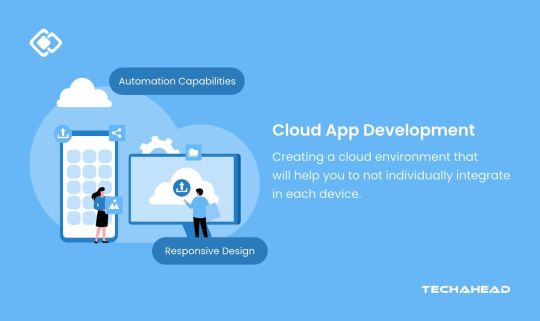
Cloud computing is rapidly transforming businesses. Many industry reports reveal that as business mobile applications grow, over 70% of digital workspaces face challenges with storage capacity and performance. The ideal solution to these issues is cloud app development, which provides unmatched scalability and flexibility.
Cloud app development simplifies data collection, enabling businesses to gather insights faster and more efficiently. It also enhances data security and streamlines management, making compliance and administration less burdensome. Cloud-powered development solutions empower businesses to create high-performance, productivity-focused applications that drive customer satisfaction and boost revenue.
Furthermore, cloud software solutions support low-code development, a time- and cost-efficient approach that minimizes extensive coding. This allows businesses to launch applications faster, optimizing resource usage and accelerating innovation cycles.

The cloud computing market is projected to grow substantially, with an estimated size of USD 0.68 trillion in 2024, anticipated to reach USD 1.44 trillion by 2029 at a CAGR of 16.40% (source: Mordor Intelligence). This robust growth highlights the rising demand for cloud solutions across industries. However, this rapid expansion in cloud applications prompts critical questions for businesses, especially around best practices in cloud app development.
In this guide, we’ll explore how to approach cloud app development effectively, the diverse cloud-based application solutions available, and how they drive value. You’ll gain insights into creating cloud applications that enhance operational efficiency, scalability, and customer engagement.
Let’s begin by examining the essentials that pave the way for efficient and future-ready cloud app development.
What is Cloud App Development?
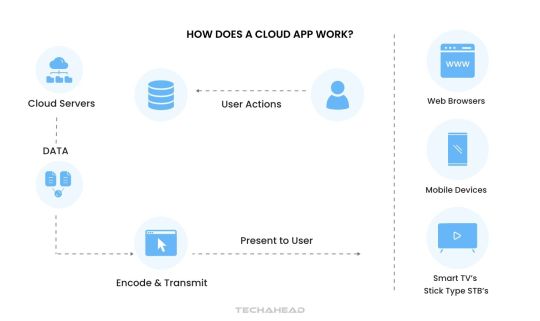
Cloud app development refers to creating applications within a cloud environment, bypassing the need for local servers. Unlike native applications, cloud-based apps rely extensively on cloud app development services, including data storage and processing, making them accessible through web browsers and other online platforms.
As enterprise development grows more reliant on cloud capabilities, they have leveraged its computational power to build groundbreaking solutions, transforming what’s possible in technology. Cloud services now empower companies to create a vast range of cloud applications that operate seamlessly on the web, often known as web apps.
These cloud apps are reshaping various business functions, taking over essential tasks like email, word processing, file storage, data collection, and even financial accounting. Through cloud app development, organizations are equipped with efficiency, streamline operations, and scale solutions like never before.
Types of Cloud App Development
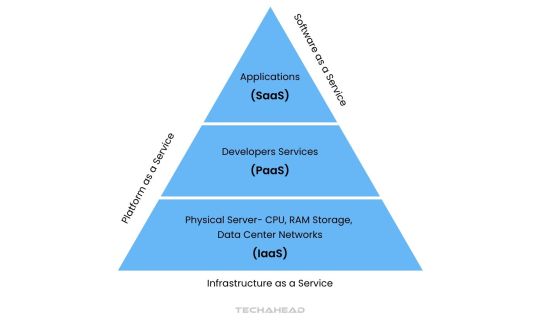
Software-as-a-Service (SaaS)
SaaS applications are hosted and maintained entirely by a cloud provider, making them accessible via the internet through web browsers. These applications relieve businesses from handling updates, server management, and software installations, as all maintenance is centrally managed by the provider. Users can seamlessly access features, integrate productivity tools, and share data across teams, which enhances operational efficiency.
Solutions like Google Workspace, Salesforce, and Slack exemplify SaaS by providing essential tools for collaboration, sales, and project management within a single, easily accessible platform.
Platform-as-a-Service (PaaS)
PaaS offers a managed environment for application development, which includes tools for building, testing, and deploying software while the cloud provider oversees infrastructure. By managing hardware and backend services, PaaS enables development teams to focus solely on cloud app development without the burden of configuring servers or databases. This platform accelerates time-to-market and streamlines scaling since the underlying resources are automatically adjusted as demand increases.
Examples like Microsoft Azure App Services and Google App Engine give developers robust frameworks and APIs, helping them build complex applications with minimal operational overhead.
Infrastructure-as-a-Service (IaaS)
IaaS delivers essential computing infrastructure such as virtual servers, storage, and networking resources. Unlike traditional on-premises infrastructure, IaaS allows businesses to pay for only the resources they use, which is ideal for scaling and managing large workloads flexibly. This model offers extensive control over the infrastructure, enabling IT teams to customize their environments and manage systems as needed.
Leading providers like AWS, Azure, and Google Cloud Platform provide services that allow companies to extend, scale, and secure their infrastructure easily, aligning with cloud app development needs for flexibility and resilience.
Function-as-a-Service (FaaS)
FaaS is part of serverless computing, allowing developers to deploy discrete code functions triggered by specific events, like user actions or system updates. With FaaS, there’s no need to manage or scale servers manually; the cloud provider handles it automatically based on demand. This model is ideal for applications requiring quick responses to high volumes of concurrent events, as it enhances cost efficiency and operational simplicity.
Popular FaaS services include AWS Lambda and Google Cloud Functions, which cater to cloud app development that prioritizes lightweight, highly scalable, and event-driven functionality.
Container-as-a-Service (CaaS)
CaaS leverages containers—lightweight, portable units of software that package application code along with its dependencies—for more efficient deployment and scaling across different environments. This model is highly beneficial for businesses adopting microservices architectures, as containers improve consistency in app deployment from development to production. CaaS platforms utilize orchestration tools, like Kubernetes, to automate the deployment, scaling, and management of containerized applications across multiple cloud or on-premises environments.
CaaS aligns with cloud app development demands for agility, allowing applications to scale seamlessly across hybrid or multi-cloud setups without compatibility issues.
Features of Every Cloud App Development Should Have
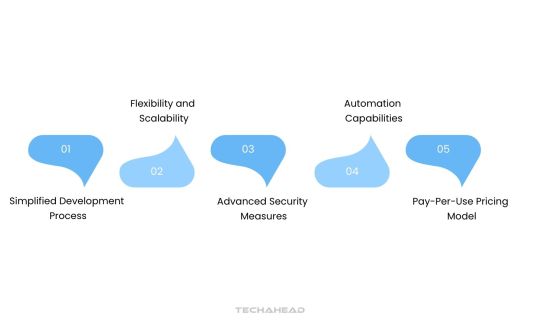
Simplified Development Process
An effective cloud app development platform should prioritize speed and simplicity. It should streamline architectural decisions, reducing complexity in creating and deploying applications across diverse technical environments. This simplicity allows hired developers to address challenges faster, minimizing errors and accelerating deployment. An efficient platform optimizes the overall development workflow, making it seamless to launch applications that meet high standards across various infrastructures.
Flexibility and Scalability
In cloud app development, flexibility is paramount. A robust platform should allow users to easily scale resources—adding or removing computing power, storage, and networking assets as demands fluctuate. Through automated scaling, these platforms adapt to dynamic workloads, preventing bottlenecks while ensuring optimal performance. During peak demand, a well-configured platform should instantly increase resources, and when demand lessens, it should scale down, maximizing cost-efficiency and resource allocation.
Advanced Security Measures
Security in cloud app development is a core feature, as cloud platforms employ top-tier security experts dedicated to threat management. These platforms adhere to stringent security protocols, often exceeding the protection provided by in-house teams. With compliance measures integrated, organizations can meet industry and governmental regulations effortlessly. Notably, 91% of companies report improved regulatory compliance post-cloud migration, emphasizing the cloud’s ability to safeguard data and ensure confidentiality.
You can also learn about the pillars of AI security and how it is protecting future technology.
Automation Capabilities
Automated processes are vital for managing complex, repetitive tasks in cloud app development. Advanced platforms support continuous integration and resource orchestration, which reduce operational burdens. Automation tools manage workload scaling, ensuring resources are available when needed without manual intervention. This allows IT teams to support growing demands efficiently while concentrating on strategic initiatives, enhancing overall operational efficiency.
Pay-Per-Use Pricing Model
A pay-per-use model enhances cost control within cloud app development, as users only pay for what they consume. This approach eliminates unnecessary expenses, allowing businesses to scale resources economically. Cloud providers track and report usage metrics, helping users monitor and optimize expenses. Some providers also offer a base level of free storage or computing power, making cloud resources even more accessible for startups and small businesses.
Steps to Take While Developing a Cloud App
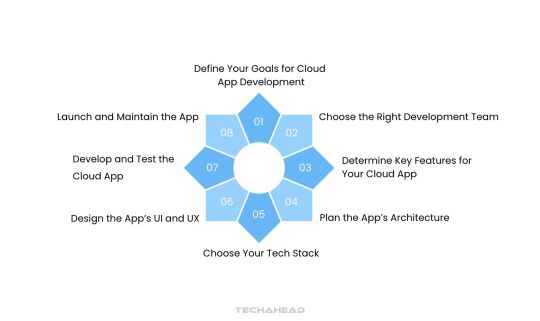
Creating a cloud app can involve web or mobile solutions, with the required technologies varying by solution type. Despite technical differences, the fundamental process in cloud app development follows similar phases to build a robust, user-centered application.
Step 1: Define Your Goals for Cloud App Development
Establishing clear objectives is crucial before development begins. Align all stakeholders on the project’s vision and goals during the discovery phase, helping the team understand the core business needs.
Reasons to consider cloud app development include:
Workflow automation: Streamlining repetitive tasks saves time and resources
Centralized data storage: Access and manage data easily within a single, organized environment.
Enhanced team collaboration: Improve internal communication and ensure seamless data exchanges.
Advanced reporting and analytics: Gain valuable insights to drive data-based decisions.
The discovery phase also allows developers to identify project scope, complexities, potential challenges, and costs. If a swift market entry is critical, a Minimum Viable Product (MVP) may be the best first step.
Step 2: Choose the Right Development Team
Cloud app development requires specialized skills, so selecting the right development team is essential. You can opt for freelancers, in-house talent, or outsource to a software development company.
Choosing a reliable cloud app development partner ensures ongoing support as the app evolves. Here are some questions to assess potential developers:
Can you share similar cloud app projects you have handled?
What platforms and technologies are you skilled in?
How do you prioritize security and scalability in development?
How do you approach cost management for cloud resources?
Can you ensure effective collaboration throughout the project?
A reliable development partner can adapt the app as technology advances and business needs grow.
Step 3: Determine Key Features for Your Cloud App
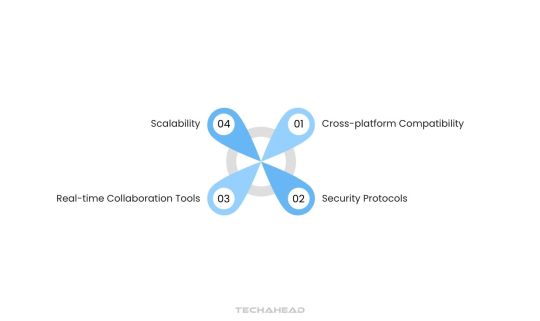
Identify core features that create a user-friendly experience in cloud applications. Essential features include:
Cross-platform compatibility: Allow users to access the app on their preferred devices.
Security protocols: Implement logins and access controls to protect user data.
Real-time collaboration tools: Enable users to work together through features like chat, live comments, and shared documents.
Scalability: Ensure the app can handle increasing users or workload.
Incorporating these features enhances user satisfaction and engagement, setting your app up for success.
Step 4: Plan the App’s Architecture
Your app’s architecture is the backbone of cloud app development, influencing scalability, security, and cost efficiency. Choose an architecture that aligns with your project’s requirements.
Key options include:
Monolithic architecture: A single, interconnected application; easy to develop but challenging to scale.
Microservices architecture: Divides the app into independent services; highly scalable but may face performance trade-offs.
Serverless architecture: Uses event-triggered functions in a serverless environment, ideal for low-maintenance, scalable solutions.
Hybrid architecture: Combines on-premises and cloud resources for high flexibility but may involve integration complexities.
Select an architecture that best aligns with your cloud app development goals. You can also look into this guide on Serverless Vs. Microservices architecture.
Step 5: Choose Your Tech Stack
The technology stack determines how quickly, securely, and effectively the app functions. Different projects require different combinations of programming languages (e.g., Java, Python, Node.js), databases (e.g., MongoDB, Firebase), frameworks (e.g., React, Angular), and containers (e.g., Docker, Kubernetes).
For instance, a Python-based stack offers scalability and maintenance ease, while Ruby on Rails works well for prototyping and collaboration. Choose the right tech stack that aligns with your app’s performance and integration needs.
Step 6: Design the App’s User Interface (UI) and User Experience (UX)
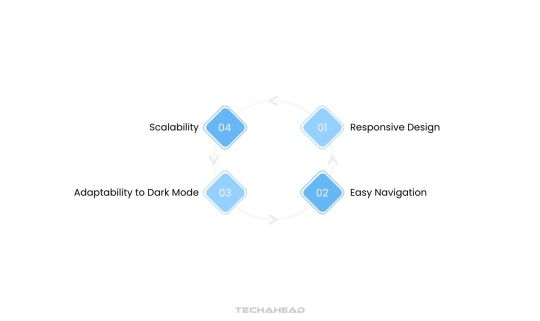
Effective UI/UX design is vital in cloud app development to create intuitive and visually appealing apps. Consider these elements:
Responsive design: Ensure seamless functionality across platforms and screen sizes.
Easy navigation: Users should quickly find what they need with minimal guidance.
Adaptability to dark mode: Offer both light and dark modes to reduce eye strain.
Scalability: Design a UI that accommodates future growth and additional features.
A responsive, intuitive, and adaptable UI makes the app user-friendly and future-proof. You can learn more about the Mobile UI designs as well.
Step 7: Develop and Test the Cloud App
Cloud app development typically uses Agile or DevOps methodologies, depending on project needs and team preferences.
Agile development emphasizes short, iterative development cycles, with regular testing and feedback after each sprint. Agile promotes flexibility, allowing the team to adapt to evolving requirements.
DevOps fosters collaboration across development and operations, with a focus on Continuous Integration/Continuous Delivery (CI/CD) and automation for efficient testing and deployment.
Both approaches streamline development, but the choice depends on team readiness and project goals.
Step 8: Launch and Maintain the App
Successful cloud app development doesn’t end with deployment. Continuous maintenance keeps your app relevant, responsive, and secure. Essential areas include:
Security updates: Regular patches to safeguard user data.
Performance optimization: Keep the app fast and responsive as usage grows.
Scalability adjustments: Ensure the app scales efficiently as demand fluctuates.
Technology updates: Adapt the stack to new versions or libraries.
Ongoing maintenance ensures a secure, scalable, and high-performing cloud app that keeps pace with technological advancements and user expectations.
Benefits of Cloud App Development
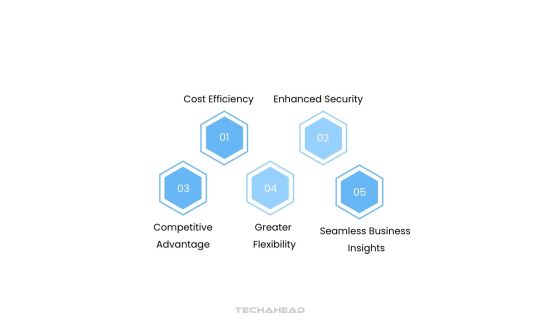
Cost Efficiency
Cloud app development significantly reduces costs by eliminating the need for on-premise infrastructure. With cloud-based applications, businesses only pay for the services they use, making it approximately 40% more affordable for small companies. This pay-as-you-go model means businesses can adjust monthly expenses based on usage, resulting in ongoing cost control.
Unlike traditional hardware, which requires significant upfront investment, cloud solutions offer flexible pricing that can scale with business growth. Additionally, many providers offer cost-saving options, like discounts on long-term contracts for larger enterprises.
You can learn more about the cost of app development.
Enhanced Security
Data security remains a huge priority when it comes to cloud app development. While integrating them, they tend to provide robust protection that safeguards sensitive information. Top cloud-based service providers employ advanced encryption techniques. It all helps in making it harder to get data accessibility for unauthorized users.
Even if there’s an intrusion attempt, encryption ensures data remains protected. Cloud hosting also includes 24/7 monitoring by specialized security teams, often surpassing the reliability of in-house systems. Research shows that 94% of businesses have reported enhanced data security after moving to cloud-based applications, demonstrating its effectiveness in managing data integrity and safety.
Competitive Advantage
Leveraging cloud app development gives companies a significant competitive edge. Cloud services handle infrastructure management, freeing up IT teams to focus on innovation and growth-centric initiatives. With a faster deployment cycle and access to the latest cloud technologies, cloud-enabled companies stay ahead in a rapidly evolving market.
Studies indicate that 77% of organizations find cloud technology helps maintain a competitive advantage. Cloud providers regularly update their offerings, allowing businesses to utilize state-of-the-art tools without needing continual hardware upgrades.
Greater Flexibility
Cloud app development introduces flexibility that in-house servers can’t match, especially in scaling resources. Teams no longer need to worry about storage or bandwidth limitations since cloud infrastructure can easily expand based on demand. This adaptability enables businesses to swiftly respond to changing market needs and to adjust resources during peak times. By outsourcing app development to cloud providers, in-house teams can focus on creating impactful solutions that directly support business objectives, fostering a more agile methodology, and resilient organization.
You can learn more about Offshore Vs. Onshore.
Seamless Business Insights
Current data-driven environment, the insights derived from cloud app development are invaluable. Cloud storage solutions offer powerful analytics tools that allow businesses to process and analyze data effortlessly. With these tools, businesses can gain actionable insights, create detailed reports, and use real-time data to enhance decision-making.
Conclusion
Cloud computing is transformative, future-ready technology that drives business scalability, efficiency, and sustainable growth. Leveraging cloud app development, companies startups or even established enterprises can significantly enhance performance, streamline operations, and cut down on overhead expenses.
Investing in cloud app development services is a strategic step for any business aiming to launch a resilient, next-gen mobile application. Given the technical expertise required for implementing cloud infrastructure in mobile applications, it’s advisable to engage skilled app developers with experience in startup solutions.
Source URL: https://www.techaheadcorp.com/blog/cloud-app-development-reaching-the-value-infection-point/
0 notes
Text
Business Development Executives || BD associate || Clerk || Data Entry Operator || Computer Operator || Godia Haat || Kolkata || West Bengal
Unlock Your Dream Job!
In this Job Post, we dive into the "Ideal Career Zone," revealing the secrets to finding your perfect profession!
Whether you’re hunting for a #job, searching #Naukri, or exploring new #Chakri options, we’ve got you covered with expert tips and career advice. From understanding your passions to mastering job searches and acing interviews, we empower you to navigate the competitive landscape with confidence!
Join us and discover how to elevate your career journey today!
About company: Welcome to exciting exploration of group dynamics within multidisciplinary organizations!
In this company, they dive deep into the powerful intersection of consulting expertise, real estate development, and innovative, scientific shoe manufacturing. Discover how this unique blend of fields fuels remarkable global investments and propels industry leaders toward success. Whether they're an aspiring entrepreneur or an established business professional, they’ll gain valuable insights into harnessing the strength of collaboration across various domains. Don’t miss out on our expert interviews and thought-provoking discussions!
The requirement for candidates is Work time 11am to 9 pm EST 1 hour break
Location: Gariahat Road Kolkata-700019
for the post of BD associate.
Key Responsibilities:
Prospecting: Identify and research potential clients using various methods, including online research, networking, and industry events.
Sales Cycle Management: Manage the entire sales cycle, from initial contact to closing deals, ensuring a smooth and efficient process.
Client Relationship Management: Build and maintain strong relationships with clients, addressing their needs and concerns in a timely and professional manner.
Proposal Development: Prepare comprehensive proposals and presentations tailored to each client's specific requirements.
Market Analysis: Conduct market research to identify industry trends and opportunities.
Sales Reporting: Track sales activities and performance, providing regular updates to management.
Team Collaboration: Work closely with other departments, such as marketing and customer success, to ensure a cohesive approach to business development.
Qualifications:
Bachelor's degree in business, marketing, or a related field.
1 to 3 years of experience in sales or business development.
Strong communication and interpersonal skills.
Excellent organizational and time management abilities.
Proven ability to build and maintain relationships with clients.
Proficiency in using CRM software (e.g., Salesforce).
Fluency in English and French is a plus.
Benefits:
Competitive salary and benefits package
Opportunities for professional growth and development
Collaborative and supportive work environment
Salary 18,000 plus incentives
For the post of Data entry clerk.
Key Responsibilities:
Accurately enter data into designated databases and systems, following established procedures.
Verify data for accuracy and completeness before entering.
Update and maintain existing data as needed.
Identify and resolve data entry errors.
Maintain data confidentiality and security.
Assist with other administrative tasks as assigned.
Qualifications:
High school diploma or equivalent.
Strong typing skills and attention to detail.
Ability to work independently and as part of a team.
Good organizational and time management skills.
Proficiency in using computers and data entry software.
Basic knowledge of data validation techniques.
Benefits:
Competitive salary and benefits package
Opportunities for professional growth and development
Stable and supportive work environment
Salary 10,000 plus incentives.
Interested candidates can apply or contact us:-
HR: 9 3 3 1 2 0 5 1 3 3
* Note:- This video is available in Hindi and Begali languages also. You can see it just search another video in hindi and Bengali voices. Many more openings available just search in Google “Ideal Career Zone” Kolkata.
You can find many more job details in various posts in various companies.
You may call us between 9 am to 8 pm
8 7 7 7 2 1 1 zero 1 6
9 3 3 1 2 zero 5 1 3 3
Or you can visit our office.
Ideal Career Zone
128/12A, Bidhan Srani Shyam Bazaar metro Gate No.1 Gandhi Market Behind Sajjaa Dhaam Bed sheet Bed cover Show room Kolkata 7 lakh 4
Thank you for watching our channel Please subscribed and like our videos for more jobs opening. Thank You again.
#BusinessDevelopmentExecutives, #BDassociate, #Clerk, #DataEntryOperator, #ComputerOperator, #GodiaHaat, #Kolkata, #WestBengal, #kolkata #panindia #idealcareerzone #data entry #CRM # administrative
0 notes
Text
Master Salesforce with the Best Salesforce Training Institute in Pune

Salesforce, the world’s leading customer relationship management (CRM) platform, is reshaping the future of businesses globally, creating an ever-growing demand for Salesforce professionals. Pune, with its thriving IT ecosystem, offers a multitude of options for those looking to upskill in Salesforce. However, selecting the best Salesforce training institute in Pune can be crucial to ensuring you get industry-relevant skills, hands-on experience, and placement support.
Among Pune’s leading options, Ethan’s Tech stands out for its comprehensive, practical, and career-oriented Salesforce course in Pune. Whether you’re a fresh graduate, a working professional, or someone looking to shift careers, Ethan’s Tech has tailored Salesforce classes in Pune that cover everything from Salesforce basics to advanced skills needed in today’s job market.
Why Choose Ethan’s Tech for Salesforce Training?
1. Industry-Relevant Curriculum:The Salesforce course at Ethan’s Tech is designed to align with the current industry standards, making it ideal for both beginners and professionals. It covers a broad range of topics, including Salesforce administration, development, cloud computing, and more. Students learn how to customize applications, manage databases, and automate processes—essential skills for a Salesforce professional. The curriculum is regularly updated to keep up with the rapid advancements in Salesforce, ensuring that students remain competitive in the job market.
2. Hands-On Training with Real-World Projects:Theory alone is not sufficient to excel in Salesforce. Ethan’s Tech believes in a hands-on approach, incorporating real-world projects and practical scenarios throughout its Salesforce classes in Pune. This allows students to apply their theoretical knowledge and get familiar with real business challenges. Working on live projects also gives students the chance to build a strong portfolio that can be a huge asset when applying for jobs.
3. Experienced Faculty and Mentorship:Ethan’s Tech has a team of highly experienced instructors who are seasoned professionals in the Salesforce domain. They bring real industry insights to the classroom and guide students in mastering even the most complex Salesforce functionalities. The mentorship at Ethan’s Tech doesn’t stop at coursework; instructors provide invaluable guidance on career growth, certification prep, and interview readiness, making it one of the best Salesforce training institutes in Pune.
4. Placement Support and Career Assistance:One of the biggest advantages of pursuing Salesforce training in Pune at Ethan’s Tech is the robust placement support provided to students. The institute offers resume-building sessions, mock interviews, and networking opportunities with leading companies in the tech industry. Graduates from Ethan’s Tech’s Salesforce program are well-prepared to enter the workforce with confidence, thanks to their strong skill set and the placement assistance provided.
5. Certification Guidance:Salesforce certifications are highly regarded in the industry and can be a key differentiator in job applications. Ethan’s Tech provides dedicated support to help students prepare for Salesforce certification exams, equipping them with the knowledge and confidence to earn credentials that boost their employability.
For More Information :
Conclusion
For anyone looking to build a successful career in Salesforce, Ethan’s Tech offers a comprehensive, hands-on, and career-focused Salesforce course in Pune. Recognized as the best Salesforce training institute in Pune, Ethan’s Tech not only provides quality training but also offers the placement assistance needed to launch a fulfilling career. With experienced instructors, real-world projects, and a curriculum that evolves with the industry, Ethan’s Tech’s Salesforce classes in Pune are ideal for anyone ready to excel in the world of Salesforce.
0 notes
Text
Enhance Your Salesforce Experience with Automated Address Validation
In today's fast-paced digital world, accurate data is crucial for any business, especially for customer relationship management (CRM) systems like Salesforce. One of the critical aspects of maintaining high-quality data is ensuring the accuracy of addresses. Automated address validation is a game-changer, helping organizations enhance their Salesforce experience by improving data integrity, optimizing marketing campaigns, and ultimately driving better customer relationships. In this article, we will explore the significance of automated address validation, its benefits, and how to implement it effectively within Salesforce.

Understanding Automated Address Validation
Automated address validation refers to the process of verifying and standardizing addresses in real-time to ensure they are accurate, complete, and deliverable. This technology employs algorithms and databases to cross-check the addresses against official postal records, allowing organizations to eliminate errors and inconsistencies. With automated address validation, businesses can ensure that the addresses they collect from customers are valid, reducing the chances of failed deliveries, inaccurate billing, and lost sales opportunities.
Why Address Validation Matters in Salesforce
Salesforce is a powerful CRM tool that enables businesses to manage customer relationships effectively. However, the value of Salesforce is directly linked to the quality of the data it contains. Inaccurate addresses can lead to various issues:
Failed Deliveries: Whether it’s physical mail, products, or marketing materials, incorrect addresses can result in failed deliveries. This not only incurs additional costs but also diminishes customer trust.
Ineffective Marketing Campaigns: When targeting customers for campaigns, incorrect addresses can hinder the effectiveness of direct mail and other marketing strategies, leading to lower engagement rates.
Poor Customer Experience: A seamless customer experience is critical. Inaccurate address data can lead to frustrating experiences, such as delayed shipments or billing errors, ultimately affecting customer loyalty.
Increased Operational Costs: Handling undeliverable mail or incorrect shipments can lead to higher operational costs. By ensuring accurate addresses, businesses can save time and resources.
Benefits of Automated Address Validation
Integrating automated address validation within Salesforce offers numerous benefits:
1. Improved Data Accuracy
Automated address validation ensures that the addresses entered into Salesforce are accurate and conform to postal standards. This results in cleaner data, which is vital for effective CRM processes.
2. Enhanced Customer Insights
With accurate addresses, businesses can gain better insights into customer demographics and preferences. This information is invaluable for tailoring marketing strategies and improving customer engagement.
3. Streamlined Operations
By automating the address validation process, organizations can significantly reduce the time spent on manual data entry and corrections. This allows teams to focus on more strategic initiatives rather than getting bogged down in administrative tasks.
4. Cost Savings
Accurate addresses lead to fewer returned shipments, reduced re-delivery fees, and lower marketing costs. This can result in substantial savings for businesses, particularly those relying heavily on direct mail and shipping.
5. Better Marketing Campaigns
With validated addresses, marketing campaigns can be more targeted and effective. Businesses can ensure that their messages reach the right audience, leading to higher conversion rates.
How to Implement Automated Address Validation in Salesforce
To leverage automated address validation in Salesforce, follow these steps:
Step 1: Choose the Right Address Validation Solution
There are several address validation solutions available that can integrate seamlessly with Salesforce. Look for a solution that offers real-time validation, comprehensive coverage (including international addresses), and robust reporting features. Popular options include:
Experian Address Validation
Melissa Data
SmartyStreets
Loqate
Step 2: Integrate the Solution with Salesforce
Once you’ve chosen an address validation solution, integrate it with your Salesforce instance. Most solutions provide straightforward installation guides and APIs that allow for smooth integration. Make sure to test the integration thoroughly to ensure it functions correctly.
Step 3: Configure Validation Rules
Customize the address validation settings based on your business needs. You can configure rules to validate addresses during data entry, batch processing, or both. This flexibility allows you to maintain data integrity at every stage of your CRM processes.
Step 4: Train Your Team
Educate your team about the importance of address validation and how to use the new tool effectively. Provide training sessions and resources to help them understand the benefits and best practices associated with accurate data entry.
Step 5: Monitor and Optimize
After implementing automated address validation, monitor its performance regularly. Use reporting features to identify any recurring issues or areas for improvement. This ongoing optimization will help you maintain the highest data quality standards.
Best Practices for Address Validation in Salesforce
To maximize the effectiveness of your automated address validation solution, consider the following best practices:
1. Validate Addresses at Entry
Ensure that addresses are validated in real-time as users enter them into Salesforce. This prevents inaccurate data from being stored in the first place.
2. Regularly Cleanse Existing Data
Implement periodic data cleansing processes to identify and rectify existing inaccuracies in your Salesforce database. This can help you maintain high data quality over time.
3. Utilize International Address Validation
If your business operates internationally, ensure that your address validation solution can handle various international address formats. This is crucial for maintaining data accuracy across different regions.
4. Set Up Alerts for Inconsistencies
Configure alerts for your team when addresses fail validation checks. This proactive approach can help catch issues early and reduce the impact on customer experience.
5. Leverage Customer Feedback
Encourage customers to provide feedback on their experience with shipping and communications. This input can highlight areas where address validation may need improvement and inform future strategies.
Conclusion
Automated address validation is a powerful tool that can significantly enhance your Salesforce experience. By ensuring the accuracy of customer addresses, businesses can improve data integrity, streamline operations, and create more effective marketing campaigns. The implementation of automated address validation not only saves time and resources but also leads to improved customer satisfaction and loyalty.
In a world where customer data is paramount, investing in automated address validation is not just a smart decision—it's essential for any business looking to thrive in the competitive landscape. By following the steps outlined in this article and adopting best practices, you can harness the full potential of Salesforce and create lasting relationships with your customers.
youtube
SITES WE SUPPORT
Bank Insurance Template– Wix
0 notes
Text
Expert Remote Salesforce Administrator
Explore the role of a proficient Remote Salesforce Administrator for your CRM needs. Our skilled team offers a human touch, providing customized solutions that enhance your Salesforce experience. Discover how remote administration can streamline your operations and optimize CRM performance. Learn more about our Remote Salesforce Administrator services on our dedicated page and leverage the full potential of your CRM system. Trust us for efficient remote Salesforce administration.
#salesforce administration services#salesforce database administrator#hire a salesforce administrator#remote salesforce administrator#salesforce delegated administration#salesforce system administrator#what is a salesforce administrator#salesforce.com certified administrator#salesforce administrator#part time remote salesforce administrator#salesforce advanced administrator#salesforce administrator roles and responsibilities
0 notes
Text
Unlock Your Career Potential: Learn Salesforce (Admin + Developer) with LWC Live Project

Introduction to Salesforce
Salesforce is the world's leading customer relationship management (CRM) platform, used by companies of all sizes to manage customer data, sales, and business processes. With over 150,000 companies using Salesforce globally, the demand for skilled Salesforce professionals continues to grow. Whether you aim to become a Salesforce Administrator, Developer, or both, mastering Salesforce Admin and Developer skills with LWC Live Projects can significantly boost your career prospects.
Why Learn Salesforce?
The Salesforce ecosystem offers a wide range of opportunities, from managing CRM systems as an administrator to developing custom solutions as a developer. Salesforce skills are in high demand, with average salaries for Salesforce professionals often exceeding $100,000 annually.
Top Reasons to Learn Salesforce:
High Demand for Salesforce Professionals: With businesses relying on Salesforce to manage their customer relationships, there is a consistent demand for Salesforce Admins and Developers.
Lucrative Career Opportunities: Salesforce roles often come with competitive salaries, especially for those skilled in both administration and development.
Diverse Career Paths: Whether you're interested in Salesforce Admin roles or want to develop custom applications as a Salesforce Developer, the platform offers diverse career opportunities.
Global Recognition: Salesforce certifications are globally recognized, making it easier to find job opportunities in different regions.
Continuous Growth: Salesforce regularly updates its platform, providing continuous learning opportunities and the ability to stay updated with the latest technology.
What You Will Learn: Salesforce Admin + Developer
When you Learn Salesforce (Admin + Developer) with LWC Live Project, you will gain a deep understanding of both the administrative and development aspects of Salesforce. Here’s a breakdown of what you will learn:
1. Salesforce Administration:
User Management: Learn how to manage user accounts, roles, and permissions.
Security and Access: Understand how to configure Salesforce security settings to protect data.
Data Management: Master data import/export, data backup, and data validation techniques.
Automation: Use tools like Process Builder and Flow to automate business processes.
Reports and Dashboards: Learn to create insightful reports and dashboards to analyze business data.
2. Salesforce Development:
Apex Programming: Learn to write custom business logic using Apex, Salesforce’s proprietary programming language.
Visualforce Pages: Develop custom user interfaces using Visualforce.
SOQL and SOSL: Master Salesforce’s query languages to interact with the database.
Triggers: Learn to write triggers to automate processes that require custom logic.
Lightning Web Components (LWC): Understand the new component-based framework used for developing modern web apps on Salesforce.
3. LWC Live Project:
Real-World Application: Apply your knowledge in a real-world project that simulates a business environment.
Building LWCs: Learn to build Lightning Web Components from scratch, integrating them with the Salesforce platform.
Advanced Development: Understand advanced development concepts such as component communication, data binding, and event handling.
Getting Started with Salesforce Admin + Developer Training
Step 1: Enroll in a Comprehensive Course
The first step to mastering Salesforce is enrolling in a comprehensive course that covers both the administrative and developer tracks. At Korshub, we promote top-quality Udemy courses that provide detailed instruction on Salesforce Admin and Developer topics. These courses are designed for beginners and those looking to upskill, offering a step-by-step guide to mastering Salesforce.
Step 2: Hands-On Practice with LWC Live Projects
Learning theory is important, but hands-on practice is where you truly develop your skills. By working on Live Projects, you'll gain practical experience in solving real-world business problems using Salesforce. This project-based learning approach is crucial for understanding how Salesforce is used in a business context.
Step 3: Certification Preparation
After completing your training and projects, the next step is to prepare for Salesforce certification exams. Earning certifications like the Salesforce Certified Administrator or Salesforce Certified Platform Developer I can significantly enhance your resume and job prospects.
Tips for Succeeding in Your Salesforce Learning Journey
1. Practice Regularly:
Consistent practice is key to mastering Salesforce. Regularly engage with the platform, practice different scenarios, and try to build custom solutions using Apex, Visualforce, and LWC.
2. Join the Salesforce Community:
Salesforce has a vibrant community of professionals who are always willing to help. Joining forums, attending webinars, and participating in Salesforce community events can provide valuable insights and networking opportunities.
3. Stay Updated:
Salesforce is continuously evolving. Stay updated with the latest features and best practices by following Salesforce blogs, joining online courses, and attending webinars.
4. Work on Real Projects:
Apply your skills by working on real projects, either in your current job or through freelancing. This hands-on experience will help you understand how Salesforce is used in a business environment.
5. Focus on Certification:
Earning Salesforce certifications can validate your skills and make you stand out in the job market. Focus on passing the certification exams to become a recognized Salesforce professional.
Career Opportunities with Salesforce Skills
Salesforce professionals are in high demand across various industries. Whether you are just starting your career or looking to advance, mastering Salesforce can open doors to numerous career opportunities:
1. Salesforce Administrator:
Role: Manage and configure Salesforce environments, ensuring that the platform meets the organization's needs.
Skills Required: User management, security, data management, automation.
2. Salesforce Developer:
Role: Develop custom solutions and applications on the Salesforce platform.
Skills Required: Apex programming, Visualforce, SOQL, Triggers, LWC.
3. Salesforce Consultant:
Role: Work with clients to implement Salesforce solutions that meet their business requirements.
Skills Required: Salesforce customization, project management, client communication.
4. Salesforce Architect:
Role: Design and oversee the implementation of complex Salesforce solutions.
Skills Required: Extensive experience in Salesforce administration and development, solution design, team leadership.
Conclusion
Learning Salesforce (Admin + Developer) with LWC Live Project is an investment in your future. As companies continue to rely on Salesforce to manage their customer relationships, the demand for skilled Salesforce professionals will only grow. Whether you want to become a Salesforce Administrator, Developer, or Architect, mastering both the administrative and development aspects of Salesforce with hands-on experience in LWC Live Projects will give you a competitive edge in the job market.
Korshub is here to support your learning journey. We promote Udemy courses that offer in-depth training and hands-on experience to help you achieve your career goals. Start your Salesforce journey today, and unlock a world of opportunities!
0 notes
Text
Best CRM Software in Bangladesh for Sales and Marketing

In today's fast-paced and competitive business environment, having the best CRM software is not just an option, but a necessity for organizations looking to streamline their sales and marketing efforts. In Bangladesh, where businesses are increasingly looking for ways to gain a competitive edge, choosing the right Customer Relationship Management (CRM) software can make all the difference.
Why CRM Software is Crucial for Sales and Marketing
CRM software is a vital tool for businesses in managing interactions with both current and potential customers. It provides a centralized platform where all customer information is stored, allowing for better management of relationships, enhanced customer satisfaction, and ultimately, increased sales. For businesses in Bangladesh, CRM software helps in:
Improving Customer Relationships: By providing insights into customer behavior and preferences, CRM systems help businesses tailor their services and communications to meet customer needs more effectively.
Streamlining Sales Processes: CRM software automates many aspects of the sales process, from lead management to follow-up tasks, allowing sales teams to focus on closing deals.
Enhancing Marketing Campaigns: With the ability to track and analyze customer data, CRM systems enable businesses to create more targeted and effective marketing campaigns.
Boosting Productivity: By integrating various business processes, CRM software reduces the time spent on administrative tasks, allowing teams to focus on more critical activities.
Top CRM Software Options in Bangladesh
1. HubSpot CRM
HubSpot CRM is one of the most popular CRM software solutions worldwide, and it has gained significant traction in Bangladesh as well. Known for its user-friendly interface and powerful features, HubSpot CRM is ideal for businesses of all sizes. Some of its key features include:
Contact Management: Easily store and manage customer information in a centralized database.
Lead Tracking: Monitor and manage leads through the sales funnel.
Sales Automation: Automate follow-up emails and other repetitive tasks to save time.
Analytics and Reporting: Gain insights into your sales performance with detailed reports and dashboards.
HubSpot CRM also offers seamless integration with other HubSpot tools, making it a comprehensive solution for both sales and marketing teams.
2. Salesforce CRM
Salesforce CRM is another leading CRM solution that is widely used in Bangladesh. It is known for its robust features and scalability, making it suitable for both small businesses and large enterprises. Key features of Salesforce CRM include:
Lead Management: Capture and track leads efficiently to increase conversion rates.
Customizable Dashboards: Customize your dashboards to get real-time insights into your business performance.
Mobile Accessibility: Access your CRM from anywhere with Salesforce's mobile app.
AI-Powered Insights: Utilize Salesforce's AI capabilities to gain deeper insights into customer behavior.
Salesforce CRM is highly customizable, allowing businesses to tailor the platform to meet their specific needs.
3. SaleBee CRM
SaleBee CRM is a robust solution tailored to satisfy all the marketing and sales needs of businesses in Bangladesh. SaleBee is designed to help organizations maintain organized records, which is crucial for analysis and report generation.
Keeping up-to-date records in an organized manner can be a challenge for many companies, and generating reports from disorganized records can be even more difficult. If records are not optimized, analyzing them can become cumbersome, potentially impacting sales and profitability. SaleBee addresses these challenges by providing an intuitive and efficient CRM solution that empowers sales and marketing teams to work more effectively. Key features of SaleBee include:
Record Management: Maintain and organize all customer records for easy retrieval and analysis.
Report Generation: Generate comprehensive reports to analyze business performance and identify trends.
Sales and Marketing Automation: Automate repetitive tasks to focus on strategic activities.
User-Friendly Interface: Easy to navigate, ensuring quick adoption by teams.
SaleBee is an excellent choice for businesses looking to overcome the challenges of record management and enhance their sales and marketing efforts.
4. Freshsales
Freshsales by Freshworks is another CRM software that has gained popularity in Bangladesh, particularly among sales-driven organizations. Freshsales is known for its intuitive design and powerful features that help businesses manage their sales processes effectively. Some of its standout features include:
Lead Scoring: Score leads based on their behavior and engagement to prioritize follow-ups.
AI-Based Insights: Use AI to predict the best times to reach out to leads and increase your chances of closing deals.
Sales Sequences: Create and automate sales sequences to nurture leads over time.
Custom Reports: Generate detailed reports to monitor sales performance and identify areas for improvement.
Freshsales is an excellent choice for businesses looking to streamline their sales processes and improve conversion rates.
5. Pipedrive
Pipedrive is a sales-focused CRM software that is becoming increasingly popular in Bangladesh. Designed by salespeople for salespeople, Pipedrive offers a user-friendly interface and a range of features that help sales teams close more deals. Key features include:
Pipeline Management: Visualize your sales pipeline and manage deals with ease.
Activity Reminders: Never miss a follow-up with automated reminders for tasks and activities.
Email Integration: Sync your email accounts with Pipedrive to manage all communications in one place.
Reporting and Analytics: Get insights into your sales performance with customizable reports.
Pipedrive is especially suited for small and medium-sized businesses that need a straightforward and effective CRM solution.
Factors to Consider When Choosing CRM Software in Bangladesh
When selecting the best CRM software for your business in Bangladesh, there are several factors to consider:
1. Business Size and Needs
The size of your business and your specific requirements will significantly influence your choice of CRM software. While large enterprises may require robust, scalable solutions like Salesforce, small businesses might find Zoho CRM or Pipedrive more suitable.
2. Budget
Budget is a critical consideration for many businesses in Bangladesh. It's important to choose a CRM that offers the features you need at a price point that aligns with your budget. Fortunately, there are many affordable options available, such as Zoho CRM and Freshsales.
3. Ease of Use
The usability of the CRM software is crucial for ensuring that your team can quickly adopt and effectively use the platform. User-friendly options like HubSpot CRM and Pipedrive are designed with ease of use in mind.
4. Integration Capabilities
Your CRM software should be able to integrate seamlessly with other tools and platforms that your business uses. This includes email systems, marketing automation tools, and accounting software. CRM solutions like HubSpot and Zoho offer extensive integration options.
5. Customer Support
Reliable customer support is essential for getting the most out of your CRM software. Look for vendors that offer comprehensive support options, including live chat, email support, and detailed online resources.
Conclusion
Selecting the best CRM software for your sales and marketing efforts in Bangladesh can significantly impact your business's success. Whether you opt for a feature-rich solution like Salesforce or a more budget-friendly option like Zoho CRM, it's essential to choose a platform that aligns with your business needs and goals. By leveraging the power of CRM software, businesses in Bangladesh can enhance customer relationships, streamline sales processes, and drive better marketing outcomes.
0 notes
Text
IT campus guru- 100% placement Guaranteed, Best IT training institute in Nagpur
"IT Campus Guru provides a wide group of opportunities for freshers and Experienced candidate who can develop their skills and build their career opportunities across multiple Companies, even if you have average English communication skills and non IT background you can create a bright IT career with IT Campus Guru. We offer courses like Full Stack Java, Python, DoNet, Software Testing, Data Science, Power BI, Salesforce training, Oracle Database development, UI UX Web designing & development, Devops, MERN Stack, MEAN Stack training program also No Coding curriculum like Windows Administrator, CCNA, LINUX, cloud Architect and mobile IOS & Android Developer training program, and more. With faith in your abilities, we ensure 100% job Guarantee"
#it course in nagpur#it training institute in nagpur#best it training institute in nagpur#nagpur it training institute#it training in nagpur#It courses in nagpur#Best it training in nagpur#java course in nagpur#java classes in nagpur#python classes in nagpur#python course in nagpur#software courses in nagpur#data science course in nagpur#data science classes in nagpur#coding classes in nagpur#web development classes in nagpur#training and placement in nagpur#it courses in nagpur with placement#100 job guarantee course in nagpur#pay after placement courses in nagpur
1 note
·
View note
Text
Salesforce Certification Check
What are the Salesforce Certifications?
A Comprehensive Guide: Salesforce certifications are professional credentials provided by Salesforce to those who have demonstrated sufficient knowledge and expertise in multiple areas of the Salesforce ecosystem. These certifications thus foster advanced career growth with enormous appreciation in any industry. In this guide, we will discover what Salesforce certifications are, why they are important, how their authenticity is checked, major tools used during certification, popular means to achieve certification, and the eligibility criteria.
There are several types of Salesforce certifications, including:
1. Administrator Certifications: These are concerned with the abilities needed to administer and customize Salesforce applications. Examples include Salesforce Administrator and Advanced Administrator.
2. Developer Certifications: Offered to those developers involved in building, maintaining, and customizing Salesforce applications, notable certifications here are Salesforce Platform Developer I and II.
3. Architect Certifications: Offered to those professionals involved in the design and implementation of complicated Salesforce solutions, notable certifications in this respect are Salesforce Certified Technical Architect and Salesforce Certified Application Architect.
4. Consultant Certifications: This includes Salesforce implementation and optimization recommendations by consultants. Examples include Salesforce Sales Cloud Consultant and Salesforce Service Cloud Consultant.
5. Marketing Certifications: These are for Salesforce Marketing Cloud and associated tool experts. Examples include Salesforce Marketing Cloud Email Specialist and Marketing Cloud Consultant.
Why it Pays to Check for Salesforce Certification?
There are several reasons why it is necessary to check for Salesforce certification:
1. Checking Certification for Credibility: Through verification, it will prove that this is an original credential, and that the individual has met all of Salesforce's set standards. This will be useful in proving the credibility of the professional.
2. Trust: Employers or clients can fully rely on a certified professional to have sufficient skills and knowledge to work. Verification adds that extra layer of assurance that, yes, this is a certification that is current and valid.
3. Security: Verification keeps fraud and misrepresentation at bay by only allowing those people who actually pass certification exams to be recognized for it.
4. Career Advancement: When looking for jobs or rise in the career ladder, this verification could make all the difference in getting much-needed job opportunities and salary potential for applicants.
How to Verify Salesforce Certification?
Verification of your Salesforce certification is an easy process. This is how you can do it:
1. Salesforce Credential Verification Tool: This is an online tool that Salesforce provides, allowing you to verify a credential by inserting the certification ID. You can check this tool on the Salesforce website, provided you have the certification number to check its validity.
2. Salesforce Certification Verification via Email: You can also check certifications by contacting Salesforce directly via an email address, providing the requisite information like the name of the person holding the certification and their respective certification number for verification.
3. LinkedIn Profile: The majority of the certified persons reflect their Salesforce certification on their corresponding LinkedIn profile. This also does not serve as an official technique for verification, but it might act as a good indicator if the certification details correspond to the records in the database at Salesforce.
4. Third-Party Verification Services: There are third-party services available that offer verification of certification. The service typically includes a fee and may be used to attain extra validation and reporting services.
Major Tools Used in Salesforce Certification: A number of tools and resources used within the Salesforce certification process include:
1. Trailhead: Being the official learning platform for Salesforce, it offers a great collection of modules and trails which candidates can use in preparation for their certification exams. It offers interactive learning and hands-on practice in mastering Salesforce.
2. Salesforce Exam Study Guides: Official guides to each of the certification exams are posted by Salesforce, indicating topics covered, the format of the exam, and recommended study materials.
3. Practice Exams: Practice exams are available to simulate the actual certification test environment that helps candidates assess their readiness for the exam and get familiar with the format.
4. Salesforce Documentation: The official documentation of Salesforce provides one with in-depth information about features, functionality, and best practices within Salesforce. This is a very valuable resource for the exam-preparation process.
5. Community Forums: Salesforce's community forums and discussion groups help in getting a better solution from certified professionals to similar problems and path experiences. Most of the time, such forums relate to learning from others' experiences.
How to Get Popular Salesforce Certification?
There are several ways to get certified in Salesforce:
1. Trailhead: The most popular way of enrollment is through Trailhead. It has structured learning paths, hands-on challenges, and interactive modules tailored for each certification.
2. Online Courses: There are a lot of online courses which help in the preparation for Salesforce certifications. Sites like Udemy, Pluralsight, and Coursera have full-fledged courses with practice quizzes at the end.
3. In-Person Training: Salesforce offers in-class training sessions and boot camps. Of course, the session would mean direct instruction from experts at Salesforce, which is best suited to individuals who love a classroom atmosphere.
4. Study Groups: Joining study groups or forums may provide support and even motivation. Such a group often may share resources and discuss exam strategies, besides providing peer support.
5. Books and Study Materials: Many candidates refer to books and study materials designed for Salesforce certification, covering all the topics tested by this exam in some detail and hence provide good content for self-study.
Eligibility Criteria for Salesforce Certification:
The eligibility for Salesforce certification generally comprises the following :
1. Experience: Although requirements may vary from one certification to another, it is highly advisable that aspiring professionals should have hands-on experience with the use of Salesforce. Many Salesforce certifications recommend at least a certain number of hours of practical experience in the relevant role.
2. Knowledge: This may best be conceived as deep familiarity with Salesforce features and best practices relevant to respective certifications. The study through Trailhead or other study resources is highly recommended.
3. Prerequisites: Some advanced certifications may encourage or even require lower-level certificates before pursuing a certain credential. A great example is the Salesforce Certified Technical Architect, which usually requires a number of other Salesforce certifications as a prerequisite.
4. Registering for the Exam: Once this is done, the candidate must enroll in the certification test through the official Salesforce website or a testing authorized center. Requirements for registration, examination fee structure, and schedules vary in each type of examination.
Conclusion: Salesforce certifications validate the expertise a professional has within the Salesforce ecosystem and are important in creating career opportunities. Verification of these certifications is thus necessary to confirm their legitimacy and credibility. Trailhead, practice exams, and community support give enough backing to let professionals competently prepare for and attain Salesforce certifications. The eligibility criteria and knowing how people usually prepare will also guide interested candidates toward successful certification and career growth in the fast-moving area of Salesforce.
0 notes